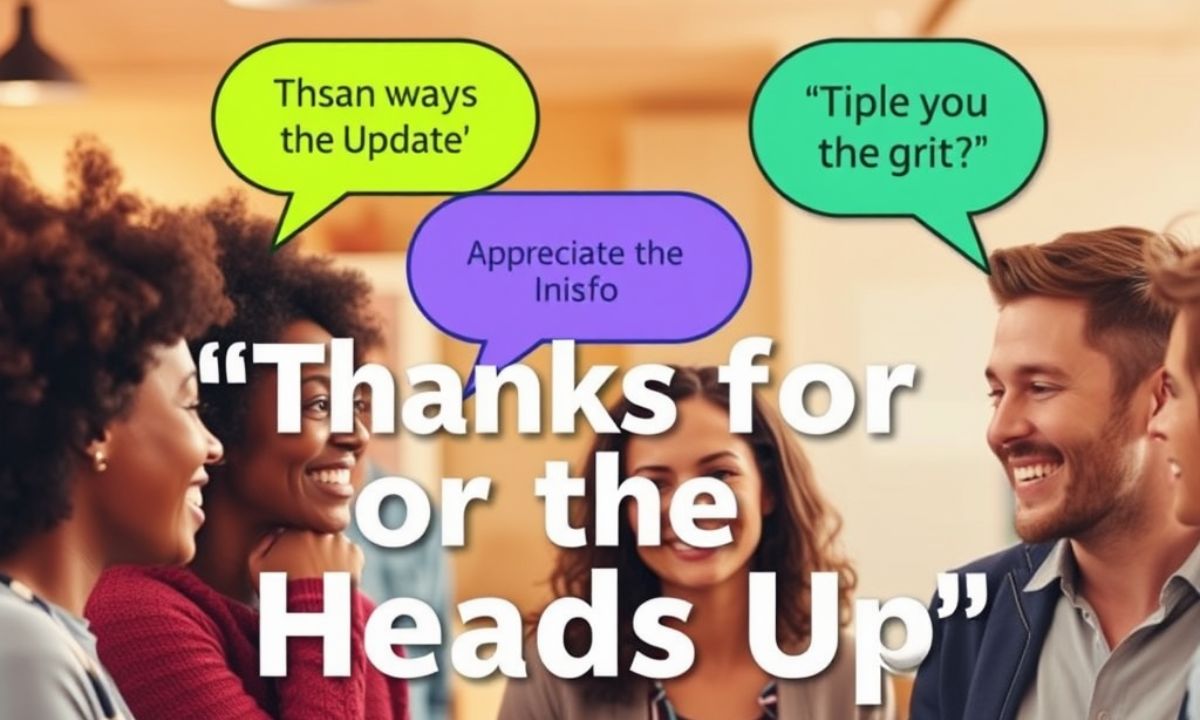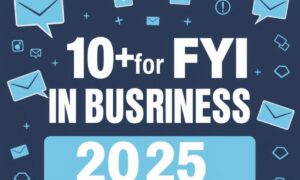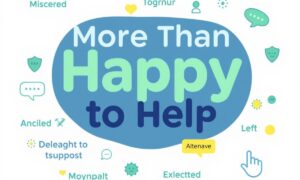There are many ways to appreciate such communication in a workplace besides the given head up.
It includes appreciating an advanced notification, appreciating the early notice about something, and many more for the head up as “thank you for informing me ahead”.
These choose words appreciate the thoughtfulness of the other person, yet keep the message polished.
It could be through formal emails or informal communications during a project update, at certain mentions where recipients can be granted appreciation for advanced warnings from any dire messages-it keeps the messages fresh and never-the-less, sincere.
Varieties of appreciation for foresight or “good looking out” are formal to informal alternatives that can be used within a workplace to develop and improve the lives humans live in workspaces-the general profession.
READ MORE: https://travelloverage.com/please-feel-free-to-contact-me/
I Appreciate the Update
Making timely updates is an important and effective communication strategy in attaining clarity and exchanging information.
It appreciates the importance of an update and develops a culture of proactive sharing that strengthens professional relationships.
Updates keep team members aligned regarding projects and allow them to respond quickly to changes in situations or priorities.
Expressions of gratitude, such as, “Thanks for the update,” convey that you value the effort taken to keep you informed and reinforce the need for an open channel of communication.
This small acknowledgment encourages ongoing sharing of information and creates a setting wherein team members feel their contributions are worthwhile.
Example: Thanks for the project timeline change updates. This helps adjust my part of the work accordingly so that we can complete this task on deadline.
Grateful for the Insight
When teammates input their opinions and observations, they bring onboard knowledge that goes into an enriched understanding for collective decision making.
Such knowledge can be expressed in being thankful for the insight received as an acknowledgment of the value of different perspectives influencing innovation and problem solving.
Most insightful suggestions tend to indicate factors possibly left out in more complete solutions. By saying “Grateful for the insight,” you recognize both content shared and selflessness of that individual by contributing personal expert opinion.
In this way, an environment that builds analytical thinking and constructive feedback is cultivated, where continuous improvement and professional development would thrive.
Example: I am grateful for the insight you provided on the customer feedback patterns because your analysis revealed trends that I had not noticed and are going to certainly inform our strategy moving forward.
Thanks for Notifying Me
Timely notifications help sustain workflow productivity and improve decision-making in work contexts. When someone keeps you updated about changing circumstances, challenges faced, or opportunities offered, they contribute to your preparedness and responsiveness.
A simple “Thanks for notifying me” in response to such actions encourages proper notification ettiquette and a continuum of information sharing. It is a quick, easy way to create a culture of communication which values notifying others in looped discussions.
Promoting appreciation for notifications could generate trust, cooperation, and ultimately increased individual productivity within teams.
Example: Thanks for notifying me with your message of the system maintenance tomorrow. Would give me time to adjust my work schedule and inform my team members?
Cheers for the Alert
When they bring up their colleagues, they demonstrate professionalism and consideration when everyone gives a timely alert about a potential problem or development.
Saying “cheers for the alert” makes it feel casual and sincere enough to acknowledge thoughtfulness, while hopefully encouraging the user to keep it up.
It reaffirms the value of alert etiquette in operation and problem prevention, as well as prompts all team members to save time or resources when they suffer early enough.
The friendly expression of gratitude translates into a community of sharing ideas where people will be looking for the success of other members.
Example: Cheers for the alert about the upcoming server outages; I will save all my work and contact my clients regarding any delays.
Much Obliged for the Info
This barely elevated style expresses deep appreciation for the recipient’s effort in conveying valuable information. Saying “much obliged for the info” recognizes the specific information but also appreciates the consideration that went into sharing it.
The expression promotes a workplace culture that embraces timely communication and shared exchange of information.
Every bit of timely and relevant information fosters team cohesion and agile responses to changing circumstances.
Showing this level of gratitude will further engender sharing and create a mutually supportive view between colleagues.
Example: Much obliged for the info on the client’s revised requirements. This allows me to fine-tune my presentation before tomorrow’s meeting.
Thank You for the Tip
Professional environments blossom when team members interact freely, sharing knowledge, suggestions, and insights aimed at helping others improve.
A simple thank you for the tip acknowledges a piece of advice which, if acted upon, could improve performance or avert potential difficulties.
This acknowledgment affirms the value of those precious moments of mentorship and opportunities for collaborative learning that naturally arise in the course of interactions between colleagues in the workplace.
By acknowledging helpful suggestions, you foster a culture of constructive feedback where sharing knowledge is a welcome behavior.
This expression fosters an atmosphere of incessant improvement where team members feel empowered to extend help and guidance which in turn will enrich the organization through enhanced collective knowledge.
Example: Thanks for the tip on the keyboard shortcut for that function. It has saved me so much time already in processing these reports.
Many Thanks for the Warning
The advance notice of potential difficulties or hazards is indicative of foresight as well as consideration for other people.
A warning about expected problems puts a person in a better position to prepare and come up with even mitigation strategies. “a big thank you for the warning” is an appreciation of providing information and making the effort to share the information.
Such an expression would encourage the practice of proactive risk management and even motivate vigilance among teams.
Organizations have an opportunity to define early signals about risks and issues so that they can place timely response measures before things spiral out of control.
This appreciation contributes to an environment where team members look out for each other’s potential problems.
Example: Many thanks for the warning about the supply chain delays. I’ll start working on alternative sourcing options immediately.
I’m Glad You Mentioned That
With regard to comments made by the other party that are especially relevant or timely, saying that one is glad to hear this one’s point acknowledges both its content and usefulness.
This phrase opens room for appreciation and encourages others to share their information and observations.
Saying that I’m glad the other party mentioned something validates the person’s comment and gives relevance to the shared information with your work or interest.
This will foster an environment of open communication, where others feel comfortable knowing that their inputs will matter and be recognized.
Apparently casual mentions of importance create a relevant flow environment-an excellent opportunity towards a common understanding and smoother decision-making paths.
Example: I’m glad that you pointed out that the client prefers visuals. I was preparing something text-heavy, but now I can modify my material accordingly.
Thanks for the Information
Straightforward and quite fortified information forms a base for good decision-making and efficient teamwork.
The time spent by someone in disclosing relevant details does contribute directly to your ability to work. Saying `thanks for the information` was a validation of such contribution and encouraged further sharing of knowledge through its use.
Simple profession courtesy reaffirms communication etiquette with such straightforward expression.
Importance of such informative exchanges defined the premise of how to establish a transparent workplace culture that encourages team members to freely share insight and updates for better-informed decisions and stronger bonding of collaboration.
Example: Thank you for this information; I can organize my documents correctly from the beginning with that-. That’s what I’ll need to do everything.
Appreciate the Heads-Up
Timely notifications regarding upcoming changes, difficulties, or chances allow enough time for adequate preparation and strategic response.
For example, one might say “I appreciate the heads up.” This recognition shows another person that their effort in letting you know beforehand will be of great help in managing situations.
This phrase affirms the asset of awareness sharing in professional settings but also motivates the active, continued sharing of notice.
Having advance warning from colleagues contributes toward improvement in efficiency of response and better outcomes.
By validating their contribution in this manner, such phrases will instill and maintain a thing called culture of transparency and collaborative effort where people actively work to keep others updated and well-prepared.
Example: Thanks for the heads-up about the change in meeting agenda. I now have enough time to prepare some additional materials for the new discussion topics.
Thank You for the Reminder
In fast-paced professional settings, reminders are great assistance for creating order and fulfilment of tasks and obligations.
When somebody gently nudges you to remember deadlines, meetings, or action points, they help guarantee that nothing goes to the back burner in your mind.
Saying something like, “thank you for the reminder” acknowledges that contributory effort and also solidifies the spirit of accountability in workplace relationships.
This demonstrates an appreciation for the other person’s vigilance while stimulating further conversations.
A reminder thus plays an important role in a person’s productivity and trustworthiness; therefore, thanking the other party for being courteous is considered professional courtesy and teamwork.
Example: Thank you for the reminder about the deadline tomorrow. With all that is going on this week, it would have easily slipped my mind.
Thanks for the Notice
Even giving advance notification of changes, decisions, or upcoming events shows respect for the time and effort of others.
Advance information helps prepare people to adapt and arrange. Saying ‘thanks for the notice’ acknowledges the mere practical value of the information in addition to courtesy, for it reminds one of notification etiquette and inspires further open communication.
Invoking notice recognition will put the person in an environment in which everyone keeps each other informed and, as a matter of principle, reduces disruptions brought about by occasional changes.
Example: Thank you for the notice regarding the office closure next Friday. That gives me plenty of time to reschedule any client meetings.
I Value Your Input
When team members make observations or suggestions, as well as feedback, they contribute towards the activation of better outcomes and better decisions.
This will be acknowledged not only to the particularity of what has been said but also to its more general significance in the viewpoint and expertise of the individual: “I value your input.”
It creates the space for collaborative exchange and diverse perspectives, thus improving problem-solving abilities.
With an explicit statement on valuing the contributions made by someone, you will foster continued engagement and thoughtful participation; it then helps build a culture for the kind of active listening and constructive dialogue that leads to more innovative solutions and increasingly stronger working relationships.
Example: I appreciate your contributions on this marketing strategy. Your insights through the customers’ lenses have made visible some critical things we now need to address.
Thanks for Keeping Me Informed
It generates a kind of space for joint alignment on coordinated decision-making such as if someone keeps one updated continuously on the incident- that could be termed professionalism or courtesy.
To express thanks, it suffices to say ‘Thanks for keeping me posted or updated,’ which acknowledges that effort and is important for effective teamwork.
It reinforces the concept of openness and proactive communication in professional relationships.
It recognizes the person’s effort in maintaining information sharing and encourages more updates – thereby building an environment where team members share relevant developments.
Example: Thank you for keeping me informed on the client’s shifting needs. Your consistent updates have allowed me to modify my work accordingly.
Your Alert Is Appreciated
Such prompt warnings about potential issues or changes are the indications of attentiveness and concern for others.
One would feel valued in saying “your alert is appreciated,” indicating the benefits of speaking up to prevent problems and inefficiencies in operations.
This is a slightly more formal expression but serves well in earnest thanks while reinforcing notification etiquette.
Team members are likely to inform one another more quickly about critical matters when they feel their alerts are valued.
It could foster a collaborative environment where people can actively contribute to maintaining the flow of information concerning matters that might affect their work or decisions.
Example: Your alert on security vulnerability has been appreciated. I’ve already started installing the recommended fixes on our systems.
FAQ’s
why would be apologizing for the receiver of the news?
Acknowledgement of information provided to you on time may persuade others to continually share information and shows respect for their effort in keeping you informed.
What works in an ambiance formal of the business?
“Thanks for the heads-up” or “The alert is much appreciated” will work fine in a business’ formal context.
How will thanking for information improve the culture of a given workplace?
A culture that thrives on open communication, welcomes people to communicate with one another, and allows information to flow.
Where do you think it is appropriate to use more informal expressions such as “Cheers for the alert”?
Utilize these with colleagues with whom you feel comfortable or in company cultures that emphasize informal communication.
How could one personalize these phrases in order to make them more relevant?
Include concrete details about how the update benefits you or what you’d do with it.
Conclusion
Effective communication is the foundation of professional relationships; here is a range of alternative expressions to replace “thank you for the heads up,” making it even more personal.
When we thank people for keeping us updated, it actually promotes a culture of openness and collaboration.
These various forms of gratitude can improve communication within the workplace and also serve to enhance personal connections forged by authentic appreciation of colleagues’ thoughtfulness.
Such an encouragement creates a reward for all those involved: in recognizing the importance of timely
Updates and alerts, we encourage and support the continued to share of insights.

I’m Irfan, an experienced SEO content and SEO specialist with 2 years of expertise, currently contributing to Al Jazeera News Website.












